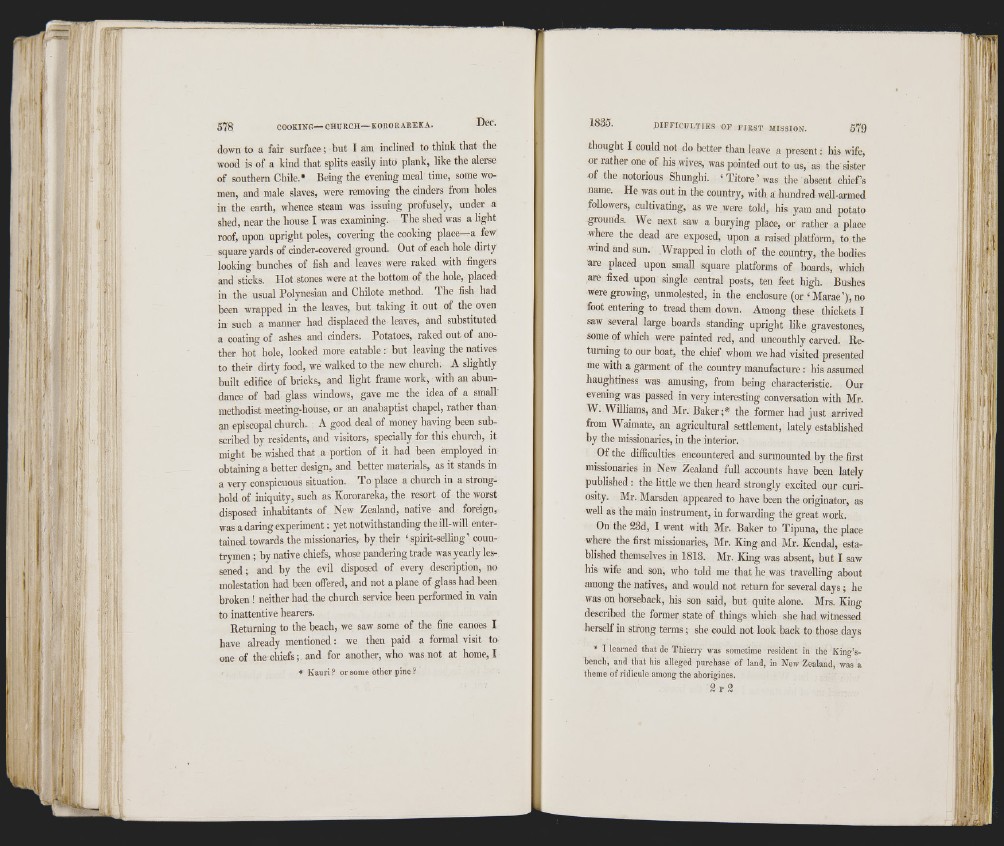
i w
0 ii,
I
578 COOKING— CHURCH— KORORAREKA. Dec.
down to a fair surface; but I am inclined to think that the
wood is of a kind that splits easily into plank, like the alerse
of southern Chile.* Being the evening meal time, some women,
and male slaves, were removing the cinders from holes
in the earth, whence steam was issuing profusely, under a
shed, near the house I was examining. The shed was a light
roof, upon upright poles, covering the cooking place—a few
squai-e yards of cinder-covered ground. Out of each hole dirty
looking bunches of fish and leaves were raked with fingers
and sticks. Hot stones were at the bottom of the hole, placed
in the usual Polynesian and Chilote method. The fish had
been wrapped in the leaves, but taking it out of the oven
in such a manner had displaced the leaves, and substituted
a coating of ashes and cinders. Potatoes, raked out of another
hot hole, looked more eatable; but leaving the natives
to their dirty food, we walked to the new church. A slightly
built edifice of bricks, and light frame work, with an abundance
of bad glass windows, gave me tbe idea of a small
methodist meeting-house, or an anabaptist chapel, rather tban
an episcopal church. A good deal of money having been subscribed
by residents, and visitors, specially for this church, it
might be wished that a portion of it bad been employed in
obtaining a better design, and better materials, as it stands in
a very conspicuous situation. To place a church in a stronghold
of iniquity, such as Kororareka, the resort of the worst
disposed inhabitants of New Zealand, native and foreign,
was a daring experiment; yet notwithstanding the ill-will entertained
towards the missionaries, by their ‘ spirit-selling ’ countrymen
; by native chiefs, whose pandering trade was tyarly lessened
; and by the evil disposed of every description, no
molestation had been offered, and not a plane of glass had been
broken ! neither had the church service heen performed in vain
to inattentive hearers.
Beturning to the beach, we saw some of the fine canoes I
have already mentioned: we then paid a formal visit to
one of the chiefs; and for another, who was not at home, I
• Kauri ? or some other pine ?
1835. niFFICULTIES OF FIRST MISSION. 579
thought I could not do better than leave a present: his wife,
or rather one of his wives, was pointed out to us, as the sister
of the notorious Shunghi. ‘ Titore’ was the absent chiefs
name. He was out in the country, with a hundred well-armed
followers, cultivating, as we were told, his yam and potato
grounds. We next saw a burying place, or rather a place
where the dead are exposed, upon a raised platform, to the
wind and sun. Wrapped in cloth of the country, the bodies
are placed upon small square platforms of boards, which
are fixed upon single central posts, ten feet high. Bushes
were growing, unmolested, in the enclosure (or ‘ Marae’), no
foot entering to tread them down. Among these thickets I
saw several large boards standing upright like gravestones,
some of which were painted red, and uncouthly carved. Beturning
to our boat, the chief whom we had visited presented
me with a garment of the country manufacture : his assumed
haughtiness was amusing, from being characteristic. Our
evening was passed in very interesting conversation with Mr.
W. Williams, and Mr. Baker ;* the former had just arrived
from Waimate, an agricultural settlement, lately established
by the missionaries, in the interior.
Of the difficulties encountered and surmounted by the first
missionaries in New Zealand full accounts have been lately
published ; the little we then heard strongly excited our curiosity.
Mr. Marsden appeared to have been the originator, as
well as the main instrument, in forwarding the great work.
On the 23d, I went with Mr. Baker to Tipuna, the place
where the first missionaries, Mr. King and Mr. Kendal, established
themselves in 1813. Mr. King was absent, but I saw
his wife and son, who told me that he was travelling about
among the natives, and would not return for several days ; he
was on horseback, his son said, but quite alone. Mrs. King
described the former state of things which she had witnessed
herself in strong terms; she could not look back to those days
• I learned that de Thierry was sometime resident in the King’s-
bench, and that his alleged purchase of land, in New Zealand, was a
theme of ridicule among the aborigines.
2 P 2
¡1J#